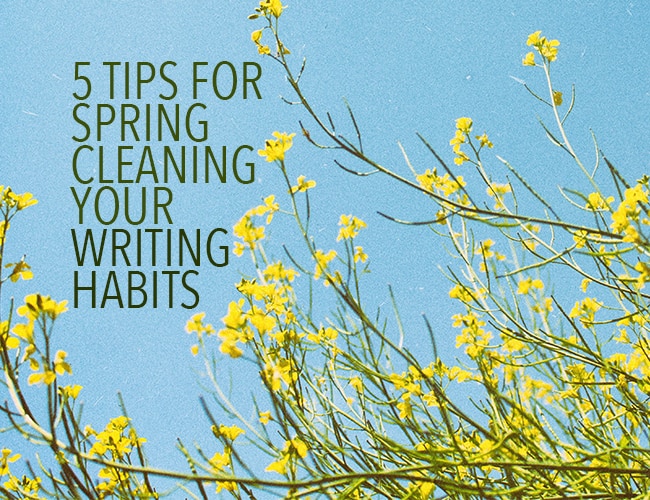Spring is almost here, which means it’s almost time to spring clean. Spring cleaning isn’t only good for cluttered houses, but for cluttered minds, as well. As writers, it’s important to learn new skills so long as it’s not at the expense of polishing old ones. Spring is the perfect time to take a look at your writing habits and do some review.

5 Steps for Spring Cleaning
Here are five things you can do to avoid falling into bad writing habits.
1. Get rid of adverbs
As Stephen King said, “the road to hell is paved with adverbs.” If you’ve ever taken a class on writing or read a few articles, you’ve probably heard that adverbs are the devil’s tool. It makes for lazy writing. If a man can walk quickly, he can march instead, or jog, or trot. Expressing those movements with adverbs is a bad writing habit.
If you feel the urge to use an adverb, take a look at your verb and see if there’s a stronger choice available to you, then go with that one.
2. Brush up on your vocabulary
You don’t have to pepper all of your paragraphs with SAT words—in fact, please don’t, as that usually makes your writing look pretentious and turns readers away—but it doesn’t hurt to throw a doozy in there every now and then.
Just make sure your ten-dollar words are well placed, somewhere that will allow them to make the greatest impact. If you call a show, for example, “bombastic” rather than “grand,” it conveys something much different.
3. Simplify your sentences
There’s a fine line between interesting writing and convoluted writing. Yes, make your prose sing, but also remember that what a reader wants most of all is to get right to the point and move on with the story. Don’t dwell on any one thing for too long for the sake of showing off your poetic phrasing or using the aforementioned ten-dollar words.
Don’t flounder. Keep things moving at a steady pace
4. Spruce up your description
There is nothing more boring than reading a tired, cliché description. As a poetry instructor of mine once said, “get weird.”
During a class all about similes and metaphors, he asked us which was more interesting to read: “Love is like a rose” or “love is like a dog from hell?”
Obviously, we all said the second one was more interesting. Why? Because it was weird, unexpected, and creative.
Don’t be afraid to be bizarre. Your writing will thank you for it.
5. Reorganize your workspace
A reliable workspace is important for any serious writer. It doesn’t have to be big or flashy. It can be as simple as a place as your kitchen table. Wherever you write, take a look at that space and make sure everything is in order.
Do some literal spring cleaning by tossing trash where it belongs, putting books back on their shelves, and making your desk as neat and tidy as possible. Orient the furniture differently, if you want. Change things up so you have room to focus and stay refreshed.
Clearing the Clutter
Our minds are full of thoughts, worries, and questions about our busy lives, all the time. With all of those preoccupations racing through our brains, it can be hard to focus on our creative pursuits, but easy to fall into bad habits. Take this as your sign to stop, inhale, exhale, and ask yourself what you can do to improve your writing habits.
What aspects of your writing do you want to polish? What writing habits do you want to develop? Let us know in the comments.
PRACTICE
Get rid of the dust bunnies in your head by free writing for five minutes. Allow yourself to make mistakes so long as you’re getting as many words on the page as possible.
Once you’ve cleared your mind, write for another ten minutes by describing some place or object that you can picture clearly. It can be your favorite library, a beloved childhood toy, anything you want. As you describe the place or object, pay careful attention to your descriptive words and imagery. Paint an interesting, creative, unexpected picture.
When you’ve finished, feel free to share your work in the comments. Don’t forget to give your fellow writers some love, too!
The Magic Violinist is a young author who writes mostly fantasy stories. She loves to play with her dog and spend time with her family. Oh, and she's homeschooled. You can visit her blog at themagicviolinist.blogspot.com. You can also follow The Magic Violinist on Twitter (@Magic_Violinist).
0 Comments